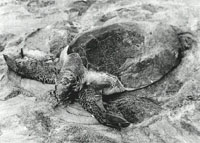GHANA
 A campaign to raise us $20,000 dollars to set up six sanctuaries for the giant sea turtle along the Atlantic coast of the West African country has been launched by the Ghana Wildlife Society. An estimate by wildlife activists states that at least two thirds of the giant sea turtles, which come ashore during August to March, are caught and slaughtered by local fisherfolk. Other animals often dig up their eggs. "If we make their nesting grounds more friendly, they can become an attraction for eco-tourists, an official of the Ghana Wildlife Society said. The society has erected billboards along some beach roads to help raise public awareness.
A campaign to raise us $20,000 dollars to set up six sanctuaries for the giant sea turtle along the Atlantic coast of the West African country has been launched by the Ghana Wildlife Society. An estimate by wildlife activists states that at least two thirds of the giant sea turtles, which come ashore during August to March, are caught and slaughtered by local fisherfolk. Other animals often dig up their eggs. "If we make their nesting grounds more friendly, they can become an attraction for eco-tourists, an official of the Ghana Wildlife Society said. The society has erected billboards along some beach roads to help raise public awareness.
The species that breed in Ghana are the Leatherback, Green Ridley and the Olive Ridley. They weigh up to 200 kg and live for over 100 years. Female turtles often swim thousands of kilometres to return to their native beaches in Ghana to lay eggs.
Related Content
- Climate finance in Ghana
- Real-world solutions for clean air and health: six city examples to inspire action on urban air pollution
- National Plastic Action Partnerships (NPAP): a multistakeholder approach to addressing plastic pollution in Developing Countries
- West Africa economic outlook 2023
- SDG 6 country acceleration case studies 2023: Ghana
- Seventh Ghana economic update: price surge- unraveling inflation’s toll on poverty and food security
